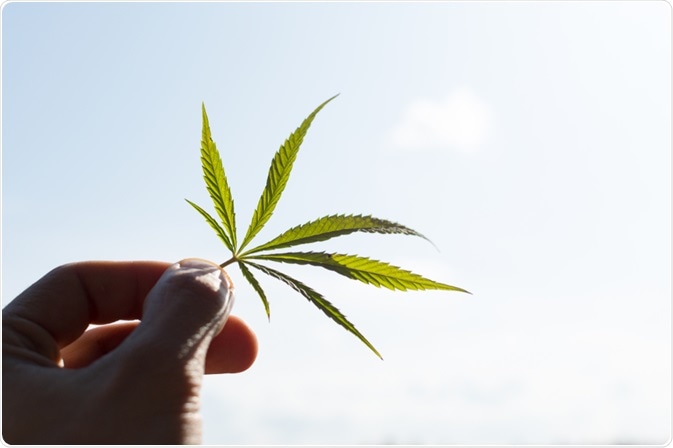Marijuana is the most widely used illicit drug in the United States. Although a considerable amount of research has been focused on the neurological effects of this drug, little work has been done to understand its cardiovascular (CV) effects.
 Image Credits: Mike Rosecope / Shutterstock.com
Image Credits: Mike Rosecope / Shutterstock.com
The pharmacodynamics of THC
The main psychoactive ingredient of cannabis is 9-tetrahydrocannabinol (THC), which has a high affinity for both the Cannabinoid 1 (CB1) and 2 (CB2) receptors in the human body.
While most of the CB1 receptors can be found in the brain and peripheral tissues, there are also several CB1 receptors located in a number of other tissues, some of which include cardiac muscle, hepatic tissue, the gastrointestinal (GI) tract and the vascular endothelium. On the other hand, CB2 receptors are primarily found in immune cells, where they play a key role in the regulation of inflammatory cytokines.
Major cardiovascular effects of THC
The action of THC on CB1 receptors may exacerbate the progression of cardiovascular disease by causing an increase in blood pressure (BP) and heart rate (HR) each time cannabis is used. In addition, chronic use of marijuana can lead to a number of other adverse CV events, including cannabis arteritis, vasospasms and platelet aggregation.
Arteritis
Originally described in the 1960s, cannabis arteritis has often been diagnosed in young cannabis smokers, most of which are male, who typically present with unilateral limb involvement. While the precise mechanisms of action behind this condition have not yet been fully elucidated, several reports suggest that an arsenic-containing byproduct of cannabis may be responsible for endothelial inflammation in these individuals.
Vasospasms
Coronary vasospasm has also been identified as a cannabis-induced adverse CV event. A coronary spasm will typically occur in angiographically normal arteries; however, when in the presence of an atherosclerotic plaque, a coronary spasm can result in a number of other complications such as rupturing of the plaque, coronary thrombosis and even myocardial infarction.
Cannabis and MIs
Although several studies have demonstrated an association between marijuana use and hypertension, dose-dependent tachycardia as well as increased risk of arrhythmias, little work has been done to explore the correlation between cannabis use and myocardial infarctions (MI).
Recently, one population study has demonstrated an increased MI incidence in association with cannabis abuse, with higher relative risk in younger individuals. The authors of this study identified 210,700 individuals with cannabis abuse, and determined that the cumulative incidence of MI was 1.28% higher among cannabis users compared to age-matched controls.
Furthermore, these researchers found that patients in the 25-29 and the 30-34 age range were at the greatest risk of MIs. Similar results were reported in a 2017 study that demonstrated increased lifetime odds of acute MI in association with recreational marijuana use. Furthermore, this study found that between 2010 and 2014, acute MI prevalence and related mortality rates also rose.
Conclusion
While there is limited data to support a direct correlation between cannabis use and increased risk of MI, it is well-established that the use of this drug can alter normal CV function. Arteritis, vasospasms, tachycardia, hypertension and arrhythmias are all significant adverse CV symptoms associated with chronic cannabis use that may ultimately lead to a greater risk of MIs.
However, in order to fully validate the correlations between cannabis use and altered CV function , further cardiotoxicity studies are necessary.
Although this article primarily described the adverse CV events associated with THC, it is important to recognize the fact that the cannabis plant contains over 500 compounds, 70 of which are psychoactive cannabinoids.
In addition to these compounds, the combustion of cannabis that occurs during smoking allows for a wide range of other chemicals such as ammonia, benzene, carbon monoxide, hydrogen cyanide and polycyclic hydrocarbons to also be inhaled. With the surging popularity of medicinal and recreational marijuana as a result of legalization picking up steam, the clinical and pharmacological evaluation of cannabis use becomes crucial.
Sources
-
Subramaniam, V. N., Menezes, A. R., DeSchutter, A., Lavie, C. J. (2019). The Cardiovascular Effects of Marijuana: Are the Potential Adverse Effects Worth the High? Missouri Medicine 116(2); 146-153.
-
Chami, A. T., & Kim, C. (2017). Cannabis abuse and risk for myocardial infarction: a population-based study. Journal of American College of Cardiology 69(11). DOI: 10.1016/S0735-1097(17)33395-8.
-
Baskaran, J., Narayanan, M. A., Vakhshoorzadeh, J., Ahmad, A., & Bertog, S. (2019). Marijuana-induced Coronary Vasospasm with Persistent Inter-coronary Connection: A Case Report and Review of Literature. Cureus 11(6). DOI: 10.7759/cureus.4799.
Further Reading
Last Updated: Mar 9, 2020